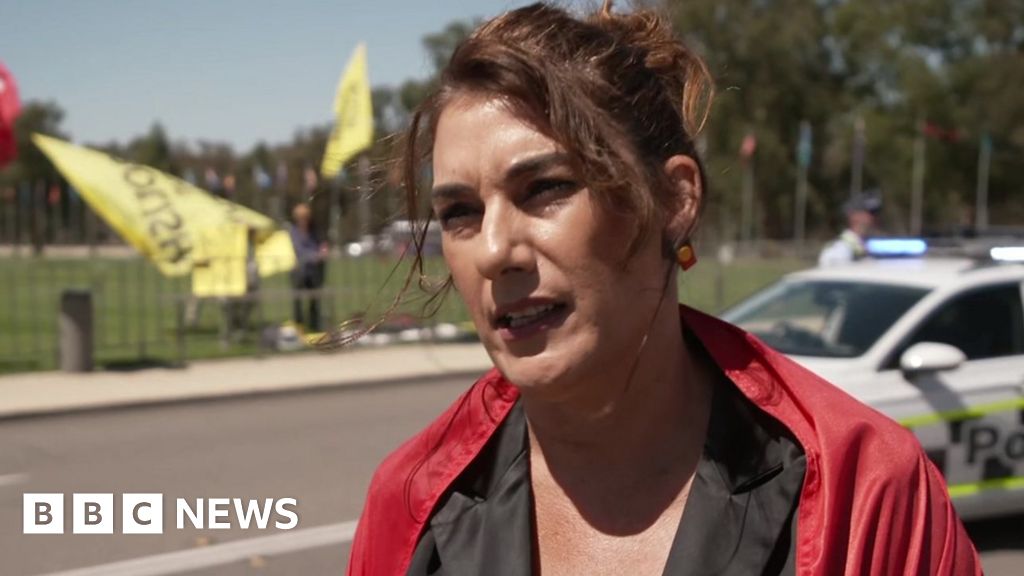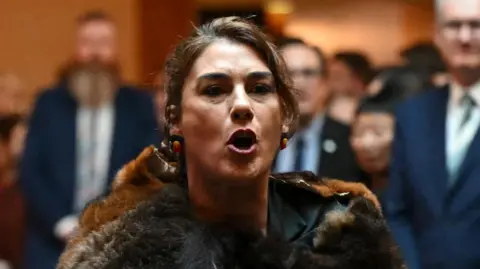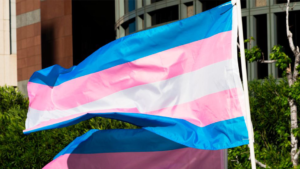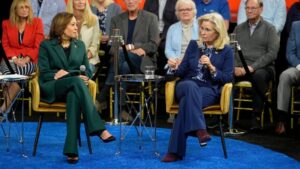Why Australian senator Lidia Thorpe heckled King Charles

Lidia Thorpe is no stranger to controversy and it’s not the first time she’s voiced her views on the British monarchy.
The Gunnai, Gunditjmara and Djab Wurrung woman has been a senator for Victoria since 2020, the first Aboriginal senator from that state.
Prior to that, she had a history of Indigenous activism – she also worked as the chairperson of Naidoc (National Aborigines and Islanders Day Observance Committee) for the state of Victoria, an organisation that works to recognise and teach Australians about First Nations cultures and their histories.
In 2022, while being sworn in to parliament after a re-election, she called the late Queen a coloniser.
“I sovereign, Lidia Thorpe, do solemnly and sincerely swear that I will be faithful and I bear true allegiance to the colonising her majesty Queen Elizabeth II,” she said, as she was being sworn in.
After criticism from other senators, she then repeated the oath as printed.
So Monday’s incident wouldn’t have come as much surprise to anyone who follows Australian politics. Lidia Thorpe has made her views clear – that British settlement saw huge numbers of Indigenous people massacred and the scars of colonisation are still very apparent for many First Nations people in Australia.
Whether or not you agree with Lidia Thorpe’s approach, the fact is that there are deep disparities between First Nations people and non-Indigenous Australians when it comes to many indicators including education, health and life expectancy.
Last year Prime Minister Anthony Albanese said a young Indigenous man was more likely to go to jail than university, which is borne out by statistics, as ABC showed.
And between 2020 and 2022, the life expectancy of Aboriginal and Torres Strait Islanders was estimated to be eight years shorter than non-Indigenous Australians.
“I wanted to send a clear message to the King of England that he’s not the King of this country, he’s not my king, he’s not sovereign,” Thorpe told the BBC after being removed from the Great Hall after heckling. “To be sovereign you have to be of this land. He’s not of this land.”
She went on.
“How can he stand up there and say he’s the King of our country – he’s stolen so much wealth from our people and from our land and he needs to give that back. And he needs to entertain a conversation for a peace treaty in this country,” she said.
“We can lead that, we can do that – we can be a better country but we cannot bow to the coloniser whose ancestors he spoke about in there are responsible for mass murder, for mass genocide.”
 Reuters
ReutersOne of Lidia Thorpe’s biggest grievances is the fact that Australia is the only Commonwealth nation that has never signed a treaty with its Indigenous people. She’s been pushing for that as a priority.
For her, last year’s referendum on a Voice to Parliament – a body made up of Aboriginal and Torres Strait Islanders providing advice to parliament on Indigenous issues – was a distraction from what was important – a treaty.
Australians resoundingly voted against the proposal and she was one of a minority of First Nations people who also voted no.
She told the BBC at the time that the Voice was about “assimilating us into the colonial constitution to make us nice, neat little Indigenous Australians that will continue to be oppressed by the coloniser”.
But she was in the minority among First Nations people to do so. Regions with a high proportion of Indigenous Australians overwhelmingly voted yes but Aboriginal people make up close to 4% of Australia’s population. Nationally, just over 60% of voters across Australia voted against.
Not all Indigenous leaders appear as troubled by royal visits as Lidia Thorpe.
Allira Davis, co-chair of the Uluru Youth Dialogue, said she respected the late Queen, even describing her as “beautiful”.
What about the current visit by King Charles?
“I don’t think it’s that important. We’re our own country,” Allira Davis told the BBC, speaking before Lidia Thorpe heckled him in Canberra.
“Understanding the history of what has happened in this country is really, really key. We’re not just a white country anymore. We’re a very brown country. We’re a very multicultural country.
“So I’m all for becoming a republic, but we need to deal with recognising our First Nations people.”
So although Lidia Thorpe reflects a view shared by many about the damage that colonisation did – and still does – not everyone agrees with her approach.
Local media have reported that former co-workers have found her difficult to work with.
But Lidia Thorpe – who is now an independent after leaving the Greens over the party’s support for the Yes vote in the referendum – is unlikely to change tack. She thinks the King needs to play a bigger role in making good the ills of the past.
#Australian #senator #Lidia #Thorpe #heckled #King #Charles
News plays a pivotal role in our lives by keeping us informed and connected to the world. It serves as a critical source of information, offering updates on current events, politics, economics, science, and more. Through news, we gain awareness of global issues and local developments, helping us make informed decisions in our personal and professional lives. News also fosters discussion and debate, encouraging critical thinking and perspective-taking. Moreover, it promotes transparency and accountability among governments, businesses, and other institutions. In a rapidly changing world, staying updated with the news enables us to adapt to new challenges and opportunities, shaping our understanding of the complexities of society. Ultimately, news is not just about information; it empowers us to participate actively in the world around us, contributing to a more informed, engaged, and responsible global citizenry.
Health is fundamental to our well-being and quality of life, making it an essential aspect of daily existence. It encompasses physical, mental, and emotional aspects, influencing our ability to function effectively and enjoy life fully. Prioritizing health allows individuals to maintain optimal physical fitness, reducing the risk of diseases and promoting longevity. Mental health, equally crucial, affects our cognitive abilities, emotional stability, and overall happiness. Investing in preventive healthcare through exercise, balanced nutrition, and regular medical check-ups helps in early detection of potential health issues, ensuring timely intervention and treatment. Beyond individual benefits, a population’s health impacts societal productivity and economic stability. Governments and organizations worldwide emphasize public health initiatives to address pandemics, health disparities, and promote overall well-being. Ultimately, health serves as the foundation upon which we build our lives, influencing our ability to pursue goals, nurture relationships, and contribute meaningfully to society.
Money plays a crucial role in our lives as a means of financial security and freedom. It enables us to meet basic needs such as food, shelter, and healthcare, while also providing opportunities for education, travel, and personal growth. Beyond material comforts, money facilitates social connections and experiences that enrich our lives. It empowers individuals to invest in their futures, whether through savings, investments, or entrepreneurial ventures, thereby fostering economic stability and growth. However, the pursuit of wealth should also be balanced with ethical considerations, as money can influence relationships and societal dynamics. Responsible management of finances is key to achieving long-term goals and mitigating financial stress. Ultimately, while money is a tool for achieving aspirations and fulfilling desires, its true value lies in how it is utilized to improve both personal well-being and the broader community.
Earning Easy Money in 2024: Opportunities and Considerations 💸
In 2024, the landscape of earning easy money presents diverse opportunities, albeit with considerations. The digital age offers platforms for freelancing, online trading, and e-commerce, allowing individuals to leverage skills and creativity for financial gain. Cryptocurrency investments continue to allure with potential for quick profits, yet they entail high volatility and risk. Moreover, the rise of the gig economy enables flexible work arrangements through apps and websites, offering quick payouts but often without job security or benefits. Passive income streams such as rental properties and investments in stocks or bonds remain viable, but demand initial capital and ongoing management. Amid these options, caution is essential to avoid scams and unsustainable ventures promising overnight success. Ultimately, while the allure of easy money persists, informed decisions, diligence, and a long-term perspective are crucial for sustainable financial growth and security in the dynamic year ahead.






